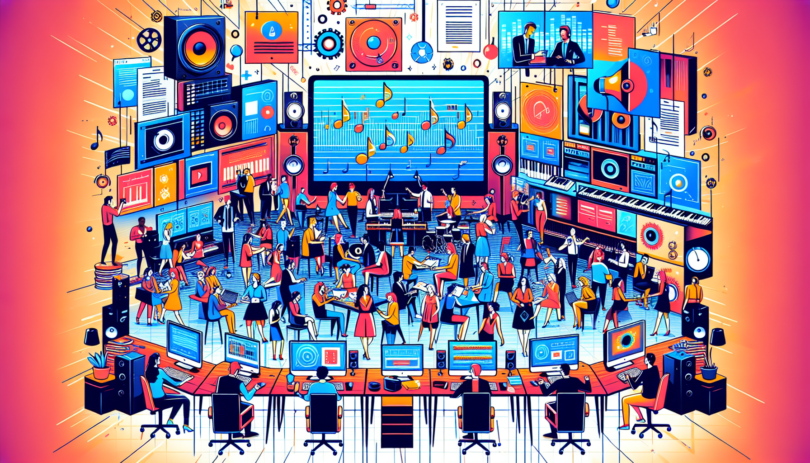Understanding the Role of Music Sync Agencies in Today’s Industry
In the dynamic world of music and media, music sync agencies hold a pivotal role that often goes unnoticed by the general public. These specialized organizations act as the bridge between musicians and various media forms, helping to align the right piece of music with the right visual content. As the entertainment industry continues to expand and diversify, the importance of music sync agencies has grown exponentially, making them a crucial element in the ecosystem of music and media.
What Are Music Sync Agencies? A Comprehensive Overview
Music sync agencies are entities dedicated to the synchronization of music with visual media. This synchronization, often referred to as sync in industry parlance, involves the integration of songs, compositions, and recordings into various forms of media such as films, TV shows, commercials, video games, and online content. The primary purpose of these agencies is to ensure that the music selected aligns perfectly with the thematic and emotional tone of the visual content it accompanies.
Historically, the concept of syncing music to visual media dates back to the early days of cinema, but the sector has seen significant growth and transformation over the decades. From the usage of popular tunes in blockbuster movies to the bespoke compositions for advertising campaigns, music sync agencies have evolved to offer a wide range of services tailored to the specific needs of their clients.
Key Functions and Responsibilities
The responsibilities of music sync agencies are multifaceted and encompass various critical functions. They curate and suggest suitable music, negotiate licensing agreements, secure necessary permissions, and manage the financial aspects of sync deals. Beyond these core tasks, they also maintain extensive relationships with artists, record labels, and media producers to streamline the sync process and ensure a mutually beneficial arrangement for all parties involved.
What Are Music Sync Agencies? A Comprehensive Overview
Definition and Purpose of Music Sync Agencies
Music sync agencies, short for music synchronization agencies, specialize in aligning music with visual media. This can include films, television shows, commercials, video games, and more. The primary purpose of these agencies is to act as intermediaries between music creators, such as artists and record labels, and media producers who require the music for their projects. By licensing music for specific uses, sync agencies ensure that proper rights are secured and the appropriate royalties are paid, benefiting both the artists and the producers.
Historical Evolution and Growth of the Sector
The concept of music synchronization has been around for decades, but the formalization of sync agencies began to gain traction in the late 20th century. Initially, the process of pairing music with visual media was managed internally within production studios, with limited focus on legalities and proper rights management. However, as the entertainment industry expanded and the use of musical scores in media became more intricate, the demand for specialized agencies increased.
Music sync agencies started to emerge as niche players in the industry, focusing on the legal and creative aspects of music licensing. Over the years, their role has evolved significantly. With the advent of digital media and streaming platforms, the demand for synchronized music has skyrocketed. Sync agencies now play a pivotal role in discovering new talent, curating music for diverse projects, and navigating the complex web of rights and royalties associated with music use.
Key Functions and Responsibilities
The responsibilities of music sync agencies are multi-faceted and essential to the seamless integration of music in media projects. Below are some of their key functions:
1. Rights Management
Music sync agencies are responsible for ensuring that all necessary rights are secured before music is synchronized with any form of media. This involves negotiating with rights holders, including songwriters, composers, performers, and record labels, to obtain sync licenses. The licenses detail how and where the music can be used, ensuring compliance with copyright laws and preventing potential legal issues.
2. Music Curation
A significant aspect of a sync agency’s role is curating music that fits the specific needs of a project. This involves understanding the creative vision of directors, producers, and advertisers, and then providing a selection of tracks that match the desired mood, tone, and emotion. Agencies rely on vast catalogs of pre-existing music as well as custom compositions to fulfill these requirements.
3. Negotiation and Contracting
Negotiating fair terms and conditions is crucial in the process of sync licensing. Agencies must strike a balance between the interests of the music creators and the media producers. This includes determining the financial aspects, such as upfront fees, royalties, and other compensations. Once terms are agreed upon, sync agencies draft and manage the contracts to ensure all parties are legally bound by the agreement.
4. Marketing and Promotion
Music sync agencies also play a key role in marketing and promoting the music they represent. Successful sync placements can significantly boost an artist’s exposure and career. Agencies often collaborate with marketing teams to leverage the visibility that comes with high-profile placements, creating additional opportunities for the music to reach broader audiences.
5. Creative Consultancy
Beyond the technicalities of licensing, sync agencies often provide creative consultancy to both music creators and media producers. They offer insights into current musical trends, give feedback on potential music uses, and help shape the overall auditory experience of a project. This holistic approach ensures that the final product is both legally sound and creatively fulfilling.
In conclusion, music sync agencies serve as a crucial bridge between the world of music and visual media. Their evolution from simple rights management entities to comprehensive service providers highlights their growing importance in today’s entertainment landscape. As the demand for dynamic and engaging content continues to rise, the role of these agencies will undoubtedly expand, offering even more opportunities for artists and creators alike.
How Music Sync Agencies Operate in Today’s Industry
The Process of Sync Licensing: From Selection to Approval
Music sync agencies have become a cornerstone in the entertainment industry, primarily through the intricate process of sync licensing. Sync licensing refers to the use of a piece of music in a visual media format, such as movies, TV shows, commercials, or video games. The process begins with the selection phase, where agencies meticulously curate a catalog of music that fits various thematic and emotional tones required by media producers. This involves not only identifying suitable tracks but also securing the necessary rights and permissions from artists, composers, and record labels.
Once a potential match is found, the music sync agency negotiates the terms of the license, detailing how the music will be used, the duration of the usage, and the financial compensation involved. This phase is critical, as it ensures that both the music creator and the media producer are in agreement about the specific terms. Following this, the approval phase involves final confirmations from all parties, including legal clearances. The meticulous attention to detail in the sync licensing process helps maintain harmonious relationships and ensures legal compliance, making it an indispensable part of the agency’s operations.
Collaboration with Artists, Labels, and Media Producers
The collaborative nature of music sync agencies is key to their effectiveness and success. To begin with, these agencies work intimately with artists to understand their creative visions and career aspirations. This close interaction helps agencies pitch the right opportunities to artists, enhancing their exposure and revenue streams.
Moreover, music sync agencies maintain strong relationships with record labels. These connections are crucial as they facilitate access to a broader catalog of music, enabling the agency to offer diverse options to media clients. Record labels also benefit by gaining additional revenue streams and promotional avenues for their artists. The symbiotic relationship between music sync agencies and labels ensures that both parties can leverage each other’s strengths for mutual benefit.
On the media production side, music sync agencies serve as essential partners providing curated musical selections that enhance the storytelling aspect of visual media. Collaborations with film and TV producers, advertising agencies, and game developers ensure that the chosen music aligns perfectly with the project’s creative vision. The agency acts as a bridge, translating the media producer‘s needs into actionable music choices, thus ensuring a seamless integration of audio and visual elements.
Technological Advancements Impacting Sync Agencies
Technology has dramatically reshaped the landscape in which music sync agencies operate. The advent of sophisticated software tools and platforms has streamlined many aspects of the sync licensing process, from music selection to rights management. With artificial intelligence and machine learning, agencies can now analyze vast amounts of data to predict music trends and tailor their offerings more precisely to the needs of media producers.
Digital databases and cloud-based storage solutions have revolutionized how agencies maintain and access their music catalogs. This has not only improved efficiency but also made it easier for sync agencies to update their offerings in real-time, providing clients with the most current and relevant music options. Additionally, enhanced search algorithms allow for quicker and more accurate discovery of tracks that fit specific criteria, such as mood, tempo, or genre.
Blockchain technology is another groundbreaking advancement impacting the industry. It promises greater transparency and reliability in rights management and royalty distribution. By leveraging blockchain, music sync agencies can ensure that artists and other rights holders receive fair compensation promptly and without disputes.
The integration of these technological tools has made it possible for music sync agencies to operate with greater precision and efficiency, thus better serving both artists and media producers. As technology continues to evolve, it will undoubtedly further refine the processes and capabilities of music sync agencies, ensuring they remain vital players in the ever-changing landscape of the entertainment industry.
The Impact of Music Sync Agencies on Artists and the Market
Opportunities for Artists Through Sync Deals
Music sync agencies play a crucial role in creating numerous opportunities for artists in today’s dynamic music industry. One of the primary advantages these agencies offer is the ability to get an artist’s music featured in various media formats, including television shows, movies, commercials, and video games. This exposure not only helps artists reach a broader audience but also leads to increased revenue streams. Sync deals can provide significant financial benefits through licensing fees, which are usually upfront payments made to the artists for the use of their music.
Moreover, being included in a popular media piece can significantly boost an artist’s credibility and career. When a song is featured in a high-profile movie or a viral commercial, it often garners attention from both fans and industry insiders. This kind of exposure can lead to additional opportunities, such as collaborations, live performances, and even signing with major record labels. Furthermore, sync placements often result in a surge of streaming and download numbers, contributing to higher sales and royalties.
Case Studies: Successful Sync Placements in Media
To illustrate the massive impact that music sync agencies can have, let’s take a look at some notable case studies of successful sync placements in various forms of media.
One iconic example is the use of Don’t Stop Believin’ by Journey in the final episode of The Sopranos. This placement led to a remarkable resurgence in the song’s popularity, bringing it back onto the music charts decades after its initial release. The show’s decision to feature this classic rock anthem highlighted the song’s emotional resonance, cementing its place in cultural history and significantly boosting Journey’s profile.
Another compelling case is that of the artist Lorde, whose breakout hit, Royals, was featured in numerous TV shows and commercials shortly after its release. The song’s sync placements played a crucial role in propelling Lorde from a relatively unknown artist to an international sensation. The synchronization of Royals with various media projects not only increased its reach but also helped Lorde establish a unique identity in the music industry.
Additionally, the band Imagine Dragons experienced significant success with their song Radioactive, which was used in a variety of TV shows, movies, and advertisements. The song’s pervasive presence across media platforms helped it achieve multi-platinum status and solidified Imagine Dragons as one of the leading bands in the modern rock scene.
Future Trends and Predictions for Music Sync Agencies
As the music industry continues to evolve, music sync agencies must adapt to emerging trends and technological advancements. One of the most promising future trends is the integration of artificial intelligence (AI) and machine learning in the sync process. AI can help agencies identify the perfect songs for specific scenes or advertisements by analyzing vast amounts of data on musical preferences, emotional impact, and historical success rates of similar placements. This technology-driven approach can enhance efficiency and accuracy, ensuring that the right music is matched with the right media projects.
Another key trend is the growing importance of global markets. With the rise of streaming services and the increasing accessibility of international content, music sync agencies have the opportunity to tap into diverse markets around the world. By recognizing and leveraging regional musical styles and preferences, agencies can facilitate cross-cultural collaborations and expand the reach of their artists on a global scale.
The digital transformation of the music industry also suggests an increased role for sync agencies in gaming and virtual reality (VR) experiences. As video games and VR become more immersive, the demand for engaging and contextually appropriate music will continue to grow. Sync agencies that can effectively place music within these interactive environments will open new avenues for artist exposure and revenue generation.
Furthermore, the need for sustainability and social responsibility is expected to shape the actions of music sync agencies in the coming years. As consumers and creators become more conscious of environmental and ethical issues, agencies will likely prioritize partnerships with artists and media producers who advocate for positive change. Sync deals that align with green initiatives, humanitarian causes, or social justice movements can boost an artist’s reputation and resonate more deeply with audiences.
In conclusion, music sync agencies are indispensable players in the modern music industry, offering significant opportunities for artists and influencing market dynamics. Through successful sync placements, artists can attain greater visibility, credibility, and financial success. As technology and global trends continue to evolve, these agencies are poised to adapt and drive innovation, ensuring that music continues to be a powerful and integral part of our media experiences.
The Ongoing Influence of Music Sync Agencies in the Modern Industry
Music sync agencies undoubtedly play a pivotal role in the contemporary music and media industries. By bridging the gap between musicians and media producers, these agencies ensure that high-quality music finds a strategic place in a variety of media formats, from films and TV shows to advertisements and online content.
The evolution of music sync agencies from their nascent stages to their current, more sophisticated form highlights their growing importance. With the advancement of technology, these agencies have adapted by integrating new tools and platforms, streamlining the sync licensing process, and enhancing collaboration efforts. This adaptability not only benefits the agencies but also provides artists with unprecedented opportunities for exposure and revenue generation.
As explored, the direct impact on artists is profound; successful sync placements can propel an artist’s career, offering both financial rewards and significant visibility. The relationship between music sync agencies and the broader market is symbiotic, fostering a dynamic environment where music‘s role in media is continuously redefined.
Looking forward, the future of music sync agencies appears bright, with trends indicating increased personalization in music placement and enhanced utilization of data analytics to predict successful sync opportunities. As the industry continues to evolve, these agencies will undoubtedly remain at the forefront of innovation, shaping the soundscapes of tomorrow’s media experiences.
Final Thoughts
The comprehensive role of music sync agencies extends beyond merely facilitating licensing; they are catalysts for artistic growth and integral players in the ever-evolving music industry ecosystem. Their influence will likely continue to expand, driven by technological advancements and the perpetual demand for compelling, well-integrated musical content in media.








